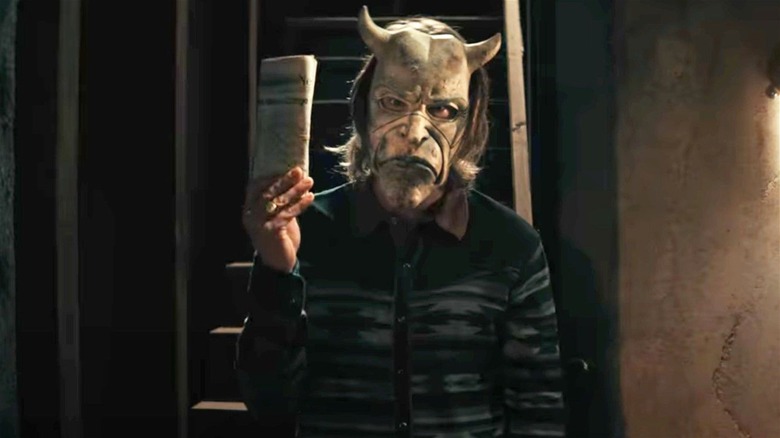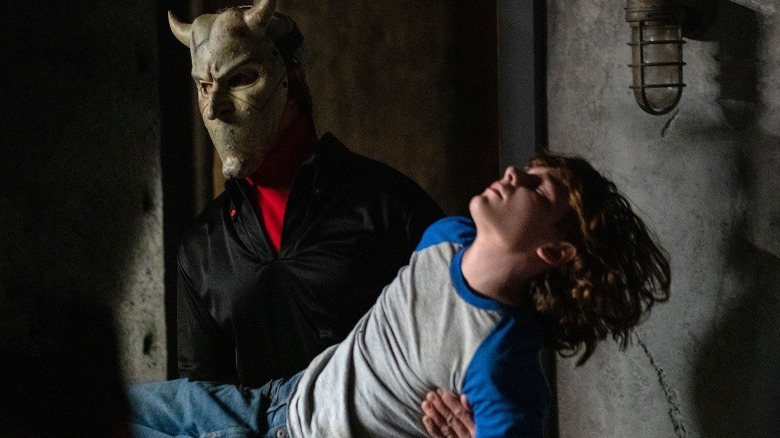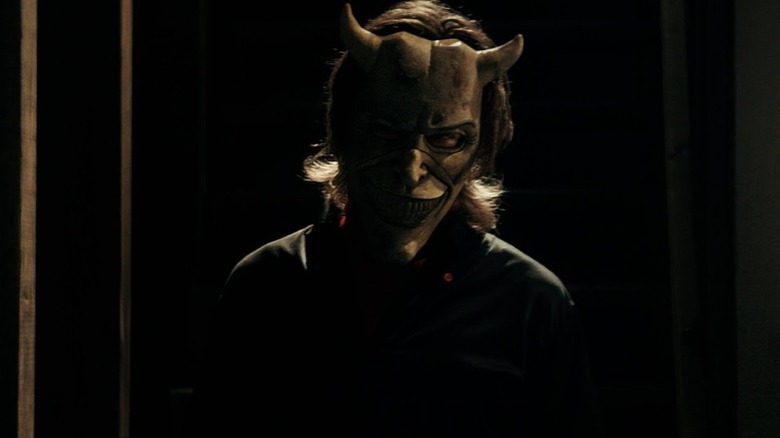The Key To Great Movie Villain, According To The Black Phone Director Scott Derrickson
Scott Derrickson's "The Black Phone" features a terrifying, sadistic villain known as the Grabber (Ethan Hawke), a child kidnapper indulging in a sick game with one of his victims in the film. Traditionally, villains in horror come with elaborate backstories, some of which are rooted in childhood trauma or some scarring incident of a certain nature, which in turn attempts to explain their heinous crimes — essentially why they do what they do.
However, the Grabber is a character rooted in the realistic portrayal of evil without resorting to conscious comparisons with real-life counterparts. In a conversation with /Film, Hawke previously explained his deliberate decision to distance the Grabber from real-life figures, including notorious serial killers like Ted Bundy or Jeffrey Dahmer. His rationale for this is a compelling one, as the narrative of "The Black Phone" is told from the point of view of the Grabber's latest victim, Finney (Mason Thames), as he experiences stark evil firsthand and attempts to escape it.
/Film's Jacob Hall spoke to Derrickson, and the horror director explained the basic tenets that constitute a great movie villain, along with the reasons why a backstory is unnecessary for encapsulating the essence of such characters. He also dived into the experience of working again with Hawke, who had previously starred in Derrickson's supernatural horror, "Sinister."
Why the Grabber is such a compelling horror villain
Although Hawke has starred in a sizeable number of horror entries, his experience of working in "Sinister" opened him up to the importance of timing in horror. Hawke also compared making a good horror to solving a complex geometry problem, laying emphasis on the importance of carefully-crafted cuts and edits that help elevate sequences tinted with terror.
Derrickson also talks about how Hawke had initially refused to play a villain again for "The Black Phone," but was convinced to take on the role after reading the script. There's an element of mutual trust that obviously plays a role in this kind of scenario, but what is more important is that Hawke understood the raw evil that the Grabber represents and decided to belt out a performance that mirrored Derrickson's idea of the character:
"First of all, the experience of Sinister was a really positive one for him [Hawke]. He had never done a horror film before, and I think he really realized on set that he didn't really know much about how to make a movie like that, and the distinctiveness of timing. And so we made a good film, and I think he's really proud of that movie.
So when I offered him the role he told me, he said, "I probably won't do it. I don't do villains," which it didn't really occur to me, but he really doesn't. But he read the script and loved it and said, 'Yes.'"
It's great that Hawke decided to say yes eventually, as we now have a terrifying villain in horror who adds to our understanding of certain twisted psyches, which are often twisted just for the sake of it.
The power of performance
Derrickson goes on to say that while the Grabber is meant to represent "one of the monsters that are out there in the world," the character does not have a distinct backstory as he does not need to. Evil can spring forth because one simply chooses to go that route, and the director drew parallels to the seemingly healthy and stable childhoods of Bundy and Dahmer, along with fictional characters such as Heath Ledger's Joker and Hannibal Lecter in "The Silence of the Lambs."
"I think that he's [the Grabber] meant to be a realistic monster. He's meant to be one of the monsters that are out there in the world...The idea of giving him some backstory that sort of explained why he is the way he is was ridiculous to me. I felt like he needed to be a mystery. And that the power and danger of him would be in the mystery. And to me, the best screen villains are like that. The power is in the performance. The power is in the uniqueness and the peculiarity of what they do."
This makes sense, as the Joker in "The Dark Knight" does not necessarily have a fleshed-out backstory, as he does not need to. In fact, there's an element of him toying with the idea of what others perceive his trauma to be, urging him to indulge in lies about why he is the way he is. While Lecter's actions are provided with a backstory in Thomas Harris' novels, "The Silence of the Lambs" paints Lecter as someone who does what he does simply because he can.
According to Derrickson, this is what constitutes a compelling villain: the unsolvable mystery of evil. The key to portraying the nuances of the same lie in the power of performance, which is exactly the route Hawke takes when portraying a remorseless, dangerous villain.
"The Black Phone" hits theaters on June 24, 2022.


